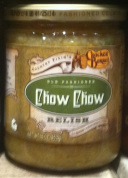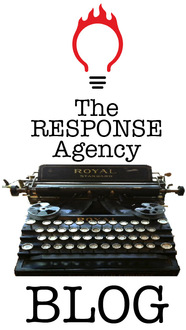
Left: I snapped this photo yesterday. It’s not really a blooper. ChowChow is the authentic name of this relish, popular in the American South and other regions. I just hope they don’t use real Chow Chows in it.
Bloopers from advertising history
When the Coors slogan was “Turn it loose,” their attempted Spanish version resulted in an idiom that in some cultures meant “Suffer from diarrhea.”
Scandinavian vacuum manufacturer Electrolux ran this campaign in America: “Nothing sucks like an Electrolux.”
Clairol introduced the “Mist Stick,” a curling iron, in Germany, later to learn that “mist” was slang for “manure.” Not too many people had use for the “manure stick.” Especially in their hair. (I am of German heritage. I am holding back a remark about my grandparents.)
When Gerber started selling baby food in Africa, they put a beautiful baby on the label. Later they learned why sales were slow. At the time in Africa, labels generally denoted contents.
Colgate introduced a toothpaste in France called Cue. Which, they later learned, happened to be the name of a French porno magazine.
To promote the Pope’s upcoming visit, a Miami company printed shirts to sell to the Spanish-speaking market. Instead of “I saw the Pope” (el Papa), the shirts read “I saw the potato” (la papa).
Pepsi’s attempt to render “Come alive with the Pepsi Generation” in Chinese resulted in something more akin to “Pepsi brings your ancestors back from the grave.”
The Spanish version of Frank Perdue’s slogan “it takes a strong man to make a tender chicken” idiomatically told some cultures, “it takes an aroused man to make a chicken affectionate.”
The Coca-Cola name in China was first rendered “Ke-kou-ke-la,” meaning “Bite the wax tadpole” or “female horse stuffed with wax,” depending on the dialect. Coke then researched 40,000 characters to find a phonetic equivalent “ko-kou-ko-le,” which means “happiness in the mouth.”
When Parker Pen marketed a ball-point pen in Mexico, its ads were intended to read, “it won't leak in your pocket and embarrass you.” Instead, they read: “It won’t leak in your pocket and make you pregnant.”
Braniff Airlines advertised its new leather-seat planes with “Sit in leather.” In Florida, the Spanish version colloquially conveyed: “Sit naked.”
—Steve Cuno
 RSS Feed
RSS Feed



